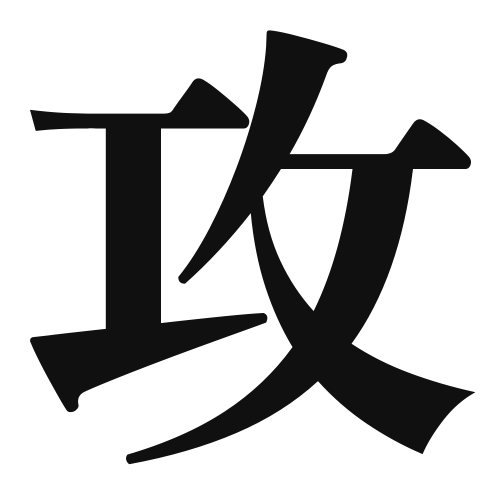1. Overview of Meaning
The kanji 攻 (pronounced “kou” in Japanese) means “to attack” or “to assault.” It conveys the idea of taking aggressive action against something or someone.
2. Formation and Radical
Formation of the Kanji: The kanji 攻 is a phonetic-ideographic character (形声文字). It combines the radical for “hand” (扌) on the left, indicating action, with the phonetic component “工” (meaning “work” or “craft”) on the right, suggesting the manner of the action.
Radical: The radical of 攻 is 扌, which relates to actions performed by the hand.
3. Examples of Usage
Common Words and Phrases: Some frequently used words that include 攻 are:
- 攻撃 (こうげき, kougeki) – “attack” or “offensive”
- 攻防 (こうぼう, koubou) – “offense and defense”
Example Sentences in Daily Conversation:
- 彼はサッカーの試合で攻撃的なプレイをした。 (かれはサッカーのしあいでこうげきてきなプレイをした。) – “He played aggressively in the soccer match.”
- 攻撃を受けたチームはすぐに反撃した。 (こうげきをうけたチームはすぐにはんげきした。) – “The team that was attacked countered immediately.”
4. Synonyms and Antonyms
Similar Kanji: A similar kanji is 襲 (しゅう, shuu), which means “to attack” or “to assault” but often carries a connotation of surprise or stealth.
Opposite Kanji: The antonym of 攻 is 守 (まもる, mamoru), which means “to protect” or “to defend.”
5. Cultural and Historical Background
Relation to Japanese Culture: The concept of 攻 is significant in various aspects of Japanese culture, including martial arts, where the balance between attack and defense is crucial.
Proverbs and Idioms: One common saying is “攻撃は最大の防御” (こうげきはさいだいのぼうぎょ, “Kougeki wa saidai no bougyo”), which translates to “The best defense is a good offense,” highlighting the strategic importance of taking the initiative in confrontations.
